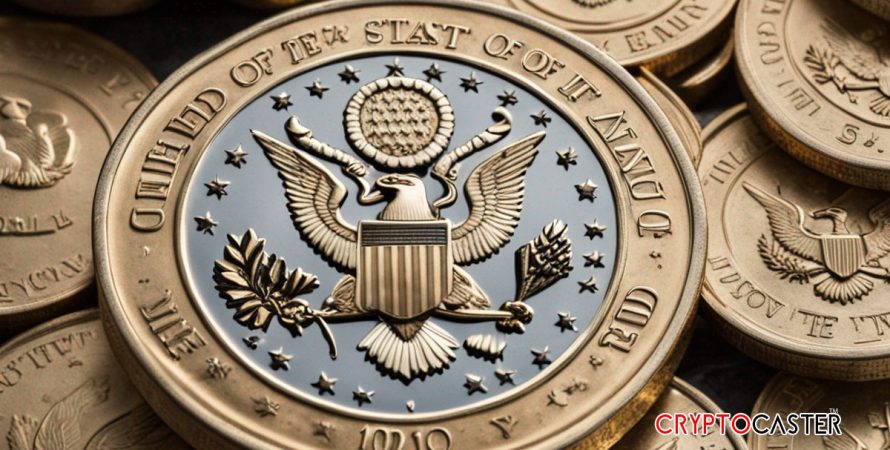The United States’ “wait and see” approach to the potential benefits of blockchain technology and digital assets falls short of the proactive steps required in this quickly expanding sector.
Caroline D. Pham, commissioner of the CFTC, agrees. She is talking about starting a sandbox, but given recent CFTC moves, one may equally interpret her statement as saying there is no need to wait for Congress.
Opyn, a defi platform that allows users to long or short ethereum, and Deridex, a defi platform that provides perpetual contracts, were both targeted by the Commodities Futures Trading Commission (CFTC).
Additionally, they filed legal action against ZeroEx, a decentralized exchange, despite the fact that the exchange itself had committed no wrongdoing by self-listing leveraged coins.
Stay in the know on crypto by frequently visiting Crypto News Today
How can they meet the Core Principles that Congress has outlined for such registrants in the CEA if the Commission is going to demand that they register as designated contract markets (“DCMs”) or swap execution facilities (“SEFs”)? – Summer K. Mersinger, a CFTC commissioner who is in disagreement.
CryptoCaster Quick Check:
“How would they be able to do so under our rules if the Commission is going to require these DeFi protocols to register as futures commission merchants (“FCMs”)?” – He went on.
He omitted to respond to his own inquiries, probably because he is unsure, we are unsure, and the defi platforms are unsure.
No time to wait for Congress means just that. Chaos. The United States has plunged into biased jurisdictional battles by unelected, power-hungry bureaucratic departments, instead of the elected representatives determining on how to balance all the conflicting reasons while being directly accountable to the public through direct elections.
God bless the judiciary, as long as it continues to demonstrate that it is truly impartial. The Securities and Exchange Commission (SEC), which completely disregarded the Major Questions theory, has been penalized by both first instance courts and Circuit appeals, costing SEC a fortune in legal fees.
Encouraged, LBRY has since submitted an appeal. A YouTube wannabe endeavor, they declared the following last year:
The SEC threatened to “bankrupt” us if we resisted them in a phone conversation as part of their effort to destroy the American blockchain sector.
Unfortunately, this unelected monster has in fact come dangerously close to bankrupting this tiny startup for the crime of trying to provide us with a different way to share our videos as Youtube becomes more and more ad-bloated and their algo finds it impossible to recommend quality content even as ChatGPT can teach you how to code an entire Youtube yourself.
We have no reason to believe that big tech and the enormous bureaucracy, which is incapable of even making decisions, are working together.
The orders issued by the Commission in these cases, according to Mersinger, “give no indication that customer funds have been improperly used or that any market participants have been harmed by the DeFi protocols.”
However, the fact that they are legitimate platforms engaging in legitimate innovation and following all the correct procedures is precisely why they are receiving attention instead of true scams. Scams won’t bring in revenue, but genuine new platforms could take on some of the bureaucracy’s real paymasters.
The commercial sector pays much more than the public sector, but only once you’ve “proven” yourself there. Revolving doors are well-known in both sectors.
On the other hand, courts, with the exception of a few rogue judges, cannot afford to be perceived in any way as being compromised by corruption.
After losing repeatedly, the SEC became so desperate that they convinced Linus Financial, which provided crypto financing products, to settle without having to pay any penalties or damages because of the “company’s cooperation and prompt remedial actions.”
Most likely because they didn’t want to in any way enhance the stakes and tempt Linus to sue them. But even if they could have afforded the legal costs the SEC might have had to pay if they lost, Linus is still a coward.
Some people surmise that not everyone can wear these boots and march around while arbitrarily vandalizing with the authority of the highest degree. That is the actual White House with the Biden at the helm.
However, there is no proof that Joe Biden, the president, is doing so foolishly. However, we advise voters to prioritize cryptocurrency in all congressional elections.
For the Senate or the House, there is no greater matter than stopping these boots for any Cryptonian or their family or perhaps even friends. For the White House, there are more important issues that need to be balanced.
Because of their plan to effectively end cryptocurrency as we know it, end open finance, convert digital currency into bank money, and rob the general public of any control over their wealth.
They want to create a world in which there are middlemen at every stage, not because they are necessary but rather because these gangsters want them. And because they don’t follow the law, like publishing judgements, they are thugs.
The Arca U.S. Treasury Fund serves as an illustration. On the Ethereum blockchain, these bonds have been tokenized. They mention ArCoins in a disclosure. We found that interesting. We checked Coinmarketcap, but there was nothing. Nothing, Coingeko.
“Exactly where do these currencies trade? Are they, for instance, on Uniswap? – we inquired of the project.
A representative stated: “While the digital shares of the Arca U.S. Treasury Fund are called ArCoin, we use RCOIN as the etherscan ‘ticker’ code.”
Since ArCoin represents the digital shares of the Arca U.S. Treasury Fund, which is registered in the United States, they are able to be moved between individuals and on digital asset security exchanges (sometimes referred to as “Alternative Trading Systems” in the US), whereas the Fund can only be transferred among whitelisted wallets.
That is, we cannot just buy or sell using MetaMask. We need to go through a process and have faith in Arca, a second middleman, that he won’t delist our address for any reason, including hypothetical ones like if we answered the wrong question.
Arca is currently undertaking a really innovative project in the trading space. This can be viewed as a transitional stage on the path of converting money from paper to code, allowing their initiative to stand apart.
However, all of our code-based finance would be converted to paper finance if the SEC or CFTC had their way. Instead of using global computers to verify blockchain trust anymore, intermediaries after intermediaries with the possibility of abuse are used instead.
Why? At some point, you must exchange your cryptocurrency for fiat. On centralized exchanges, you may perform all the checks there. When there is really no need, why do you have to whitelist and compel distrust of centralized platforms and intermediaries?
We will stay steadfast in our in our quest for monetary freedom and reform. ![]()
We hope you appreciated this article. Before you move on, I was hoping you would consider taking the step of supporting CryptoCaster’s journalism.
From Elon Musk, Larry Fink(BlackRock) to Jamie Dimon(JP Morgan Chase) a number of billionaire owners have a powerful hold on so much of the hidden agendas’ which eludes the public concerning the paradigm shift juxtaposed by cryptocurrency and web3 emerging technologies. CryptoCaster is different. We have no billionaire owner or shareholders to consider. Our journalistic efforts are produced to serve the public interest in crypto development and institutional disruptions – not profit motives.
And we avoid the trap that befalls much U.S. and global media – the tendency, born of a desire to please all sides, to engage in false equivalence in the name of neutrality and retail consumer protection. While fairness and transparency dictates everything we do, we know there is a right and a wrong position in the fight against fiat global banking interest and monetary reconstruction precipitated by the emerging crypto ecology.
When we report on issues like the FTX, Binance and Ripple crisis, we’re not afraid to name who or what is uncovered. And as a crypto sentinel, we’re able to provide a fresh, outsider perspective on the global monetary disruption – one so often missing from the insular American and European media bubble.
Around the world, readers can access the CryptoCaster’s paywall-free journalism because of our unique reader-supported model. That’s because of people like you. Our readers keep us independent, beholden to no outside influence and accessible to everyone – whether they can afford to pay for news and information, or not.
We thankyou for the on-going support our readers have bestowed monetarily. If you have not considered supporting CryptoCaster, if you can, please consider supporting us just once from $1 or more of Bitcoin (satoshi) or Eth, and better yet, support us every month with a little more. Scroll further down this page to obtain CryptoCaster’s wallet addresses.
Thank you.
Kristin Steinbeck
Editor, CryptoCaster
Please Read Essential Disclaimer Information Here.
© 2024 Crypto Caster provides information. CryptoCaster.world does not provide investment advice. Do your research before taking a market position on the purchase of cryptocurrency and other asset classes. Past performance of any asset is not indicative of future results. All rights reserved.
Contribute to CryptoCaster℠ Via Metamask or favorite wallet. Send Coin/Token to Addresses Provided Below.
Thank you!
BTC – bc1qgdnd752esyl4jv6nhz3ypuzwa6wav9wuzaeg9g
ETH – 0x7D8D76E60bFF59c5295Aa1b39D651f6735D6413D
MATIC – 0x7D8D76E60bFF59c5295Aa1b39D651f6735D6413D
LITECOIN – ltc1qxsgp5fykl0007hnwgl93zr9vngwd2jxwlddvqt
CRYPTOCASTER HEATMAP





